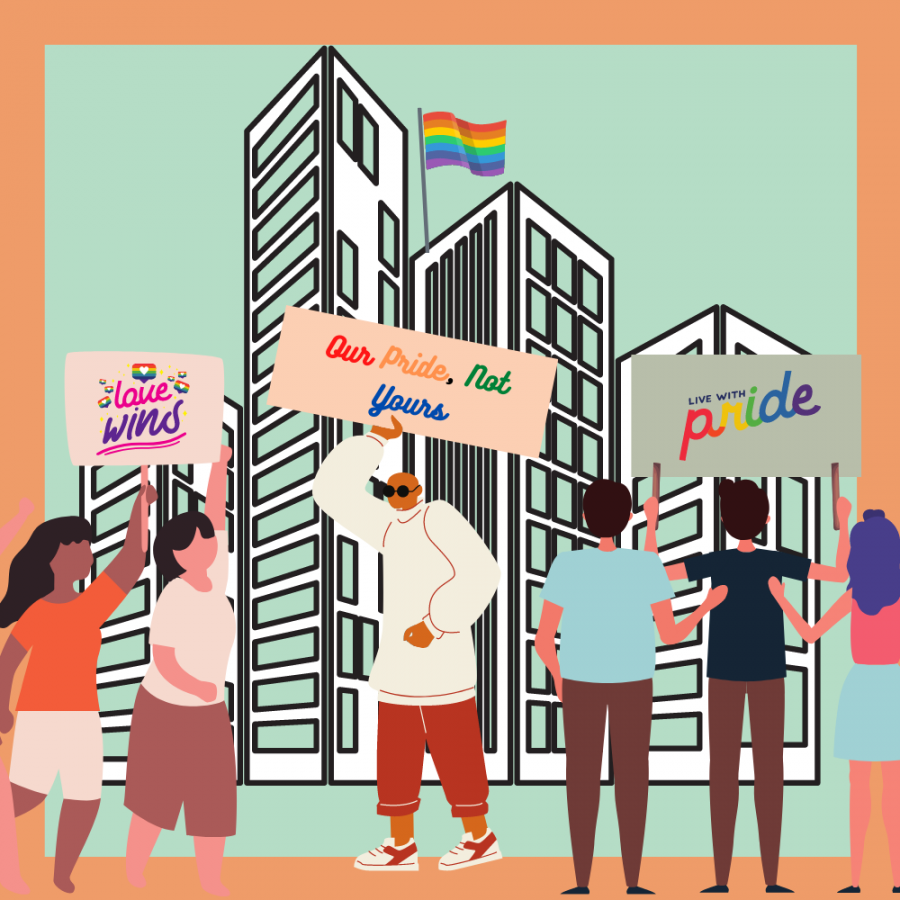“The rich, diverse culture of the community cannot be encapsulated by feel-good inclusive promotional ads or by cutesy rainbows slapped on the front of a product.”
Pride month has a long history in the United States, but it wasn’t until recently that celebrating Pride became mainstream — meaning non-LGTBQ+ entities also exist in this space.
Massive corporations in the United States have entered Pride month with force. It may be nice to see your identity represented in a company’s products. However, there are underlying issues that exist with for-profit businesses taking up so much space during Pride month.
After the Obergefell v. Hodges ruling legalized gay marriage in 2015, our country has seen an increase in public “support” from large companies during Pride month. Hundreds of large companies have developed a targeted approach to Pride including commercials with LGBTQ+ couples and customizable flag products or the company’s product with LGTBQ+ branded packaging.
It is critical to understand the products corporations are churning out are primarily concerned with increasing profit, with the community coming in a distant second. Corporations have managed to create a Pride that is manufactured — meticulously creating products for quick money from members of the community as well as allies. As a result, the LGTBQ+ community has been ultimately reduced to bands of marketable colors rather than the community being represented for what it truly is.
People who are not part of the community and don’t understand the purpose of Pride month could argue that pride-themed products are beneficial to the cause because they allow the community to be seen; however, the LGBTQ+ community is so much more than the image companies try promoting during Pride month.
The rich, diverse culture of the community cannot be encapsulated by feel-good inclusive promotional ads or by cutesy rainbows slapped on the front of a product. These products do not provide adequate exposure or education about the LGBTQ+ community to those who are unaware, and they do not provide a true representation of what it means to be LGBTQ+.
The issue with corporate participation isn’t solely the misrepresentation of the community, it also includes profit distribution. If a company has a Pride collection, it does not mean the money from that collection will make its way back to the community. In fact, the majority of the time companies do not use the profits from their Pride products to benefit the community at all — companies, essentially, exploit the LGBTQ+ community for a “quick buck” and do not reinvest the profit back into spaces that generated the money in the first place.
At the very worst, purchasing pride-themed products and supporting the LGBTQ+ friendly image corporations advertise can actually fund anti-LGBTQ+ causes.
During Pride month, some companies, such as AT&T, FedEx and Pfizer, display a rainbow logo or run inclusive advertisements while also donating millions to anti-gay politicians. It’s obvious funneling money to anti-LGBTQ+ politicians can have a direct impact on policies and laws enacted in this country, resulting in the restriction of rights for queer people.
The commodification of Pride is another matter that needs to be addressed. Companies often perpetuate the idea that in order to be a valid member of the community, an individual must be ostentatious about their identity. Reducing queerness down to a rainbow flag and article of clothing sends the message that queer people should be wearing these items to be officially recognized.
The reality is that not all people want to flaunt their queerness.
Many gay people do not want to be identified by a rainbow, and many transgender people do not want others to know they are not cisgender. These facts do not make an LGBTQ+ person any less than those who want to share that information openly.
This isn’t to say all companies that offer Pride collections are negative. It can be extremely validating to see yourself, friends and family’s identities represented on a mainstream level; however, we need to be mindful of where our money goes and question the motives of brands.
Instead of supporting big businesses, make the effort to seek out small businesses owned by LGBTQ+ individuals. Also, make sure that your money is not only uplifting white LGBTQ+ entrepreneurs but other ethnic groups as well. There are many diverse businesses that benefit the community year-round and truly strive to make positive change.
Our money has power and we must ensure this power is used to better the entire community.
Brenna Martinez is a junior studying linguistics and political science.







